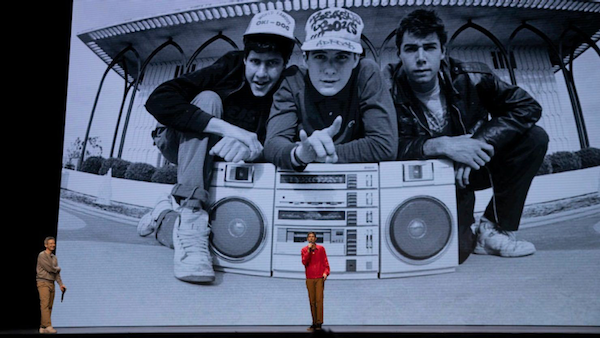Movie review by Greg Carlson
For Beastie Boys fans, the personal “soundtrack of our lives” stories are at least equal in number to the records, cassettes, and compact discs sold. Some of us got in with “Licensed to Ill” in 1986 (gratitude to you forever, Brandon Roy) and never looked back, anxiously awaiting each album and committing to memory the rhymes within 24 hours of release. If you were of a particular age and inclination, you grew, and grew up, alongside Ad-Rock, MCA and Mike D — every new project an evolutionary step in how to dress, how to sound, and how to behave.
Adam Yauch died of cancer at the age of 47 on May 4, 2012. We cried when we heard the breaking news reports. We cried again a few weeks later when mailboxes delivered the “Rolling Stone” with the black and white photo of MCA’s face on the cover.
We weren’t ready for the Beastie Boys to be over. Toward the end of Spike Jonze’s documentary “Beastie Boys Story,” available on Apple TV+, an emotional Adam Horovitz sits on the edge of the stage at Brooklyn’s Kings Theatre and talks about headlining Bonnaroo in 2009, saying, “We didn’t know it was gonna be the last show we’d ever play.”
“Beastie Boys Story” is inspired by the 572-page, cut-and-paste, oral history/memoir “Beastie Boys Book,” published in 2018. Along with Horovitz and Michael Diamond, Jonze curates the arc of Beastie Boys history, condensing and trimming much from between the covers but (mostly) making up for it by carefully selecting from an expansive vault of dazzling audio, video, and photographic documentation. Presenting to a live audience, Mike D and Ad-Rock, with lots of jokes and a few tears, acknowledge the teleprompters and their frequent miscues.
Not everyone will appreciate the artifact. Writing for Pitchfork under the headline “Spike Jonze’s New Beastie Boys Movie Is No Fun,” Jayson Greene gripes that the film is like a PowerPoint “with running commentary.” Others have tagged it as a lengthy TED Talk.
If you listen to Beastie Boys, Jonze’s technique — a familiar blend of rough and smooth, high tech and low tech — comes correct. If you don’t listen to Beastie Boys, the movie serves as a biographical and musical introduction. In addition to the importance of centralizing and eulogizing the absent MCA, speaking for him because he can no longer speak for himself, Mike D and Ad-Rock walk the viewer through several volcanic, career-altering tracks. The chapter heading “The Song That Changed Everything” turns out to be applicable more than once.
The slices and samples of Kurtis Blow, Slick Rick, and Jimmy Castor Bunch on “Hold It Now, Hit It” and Yauch’s imaginative kitchen table reel-to-reel Rube Goldberg loop of Led Zeppelin for “Rhymin and Stealin” eventually lead us to another card that says “Earlier We Had Mentioned a Song That We Thought Had Changed Everything. And It Had, in a Way. But This Is Actually the Song That Changed Everything.” You may be familiar with how that next one plays out. “(You Gotta) Fight for Your Right (To Party!)” becomes an anthem and an albatross, a skeleton key and a mummy’s curse.
When Diamond and Horovitz finally move on to the recording of “Paul’s Boutique,” the tale of which occurs about halfway through the nearly two-hour running time, one feels a sense of relief. The cartoonish dicks and boorish misogyny start to fade. The “Check Your Head” anecdotes continue to move the needle in a positive direction. It’ll be a minute before the film gets to MCA’s all-time most quoted verse, the turning point that begins “I want to say a little something that’s long overdue,” on the “Ill Communication” opener “Sure Shot.” The not-so-secret formula of longevity is so obviously found in the willingness to mature and to learn and to change. Mike D quotes Ad-Rock’s response to an interviewer’s accusation of double standards: “I’d rather be a hypocrite than the same person forever.”
